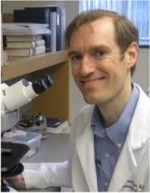Andrew Wilson, MD, Receives Funds for AATD Research
Andrew A. Wilson, MD, associate professor of medicine at Boston University Chobanian & Avedisian School of Medicine, recently received a gift of $100,000 to establish the Katharine Howe Lovett Fund for Alpha-1 antitrypsin deficiency (AATD) Research. The funds were a gift from Philip Lovett and Beatrice Liu, given in memory of Philip’s mother Katharine Howe Lovett and will be used to better understand and develop treatment for the disease.
antitrypsin deficiency (AATD) Research. The funds were a gift from Philip Lovett and Beatrice Liu, given in memory of Philip’s mother Katharine Howe Lovett and will be used to better understand and develop treatment for the disease.
“My family is pleased to present this gift to Dr. Wilson and his team as they continue their groundbreaking research into AATD,” says Philip Lovett, Founding Partner/Principal, Millennium Partners. “We hope these funds will lead to better treatments and eventually a cure for AATD.”
AATD is a genetic disease that can affect the liver or lung due to the lack of a protein made by the liver that is released into the bloodstream. The alpha-1 protein is designed to protect tissues in the body, particularly the lungs, from being attacked by its own enzymes.
Wilson is a pulmonary and critical care clinician-scientist with a long-standing focus on regenerative medicine and stem cell biology. He cofounded and directs the BU/Boston Medical Center Alpha-1 Center which has become a nationally recognized center of excellence for the care of AATD patients and their families. Additionally, he has overseen the creation of, and directs the world’s largest AATD patient-specific induced pluripotent stem cell (iPSC) repository, comprising iPSCs and reprogrammable blood samples from over 100 AATD patients linked to phenotypic data including imaging, pulmonary function, and liver biopsy results.
Under his direction, BU is participating in two large epidemiological studies funded by the Alpha-1 Foundation and the NIH to recruit and longitudinally follow AATD patients who will undergo detailed characterization of lung and/or liver function and potential injury. The goal of this research is to better define the longitudinal trajectory of the disease in affected individuals and to identify potential biomarkers that could serve as endpoints for upcoming clinical trials.
In addition to these clinical studies, Wilson oversees laboratory-based research that applies the stem cells generated from his clinic patients to understand how the disease injures their lung or liver cells. “Our hope is to better understand the genetic factors and mechanistic drivers that predispose subsets of AATD patients to develop clinical disease and to develop gene or cell-based therapies for this condition,” adds Wilson who also is a pulmonary specialist at Boston Medical Center.